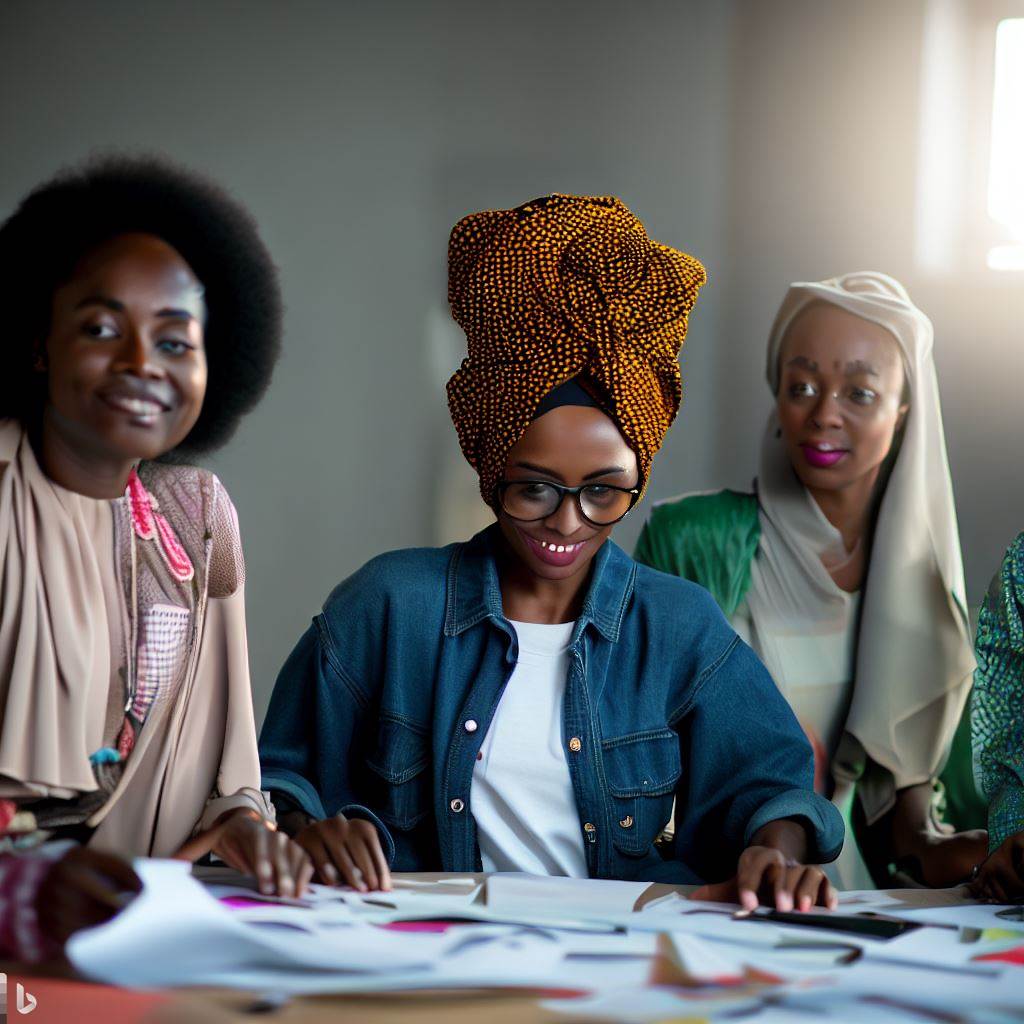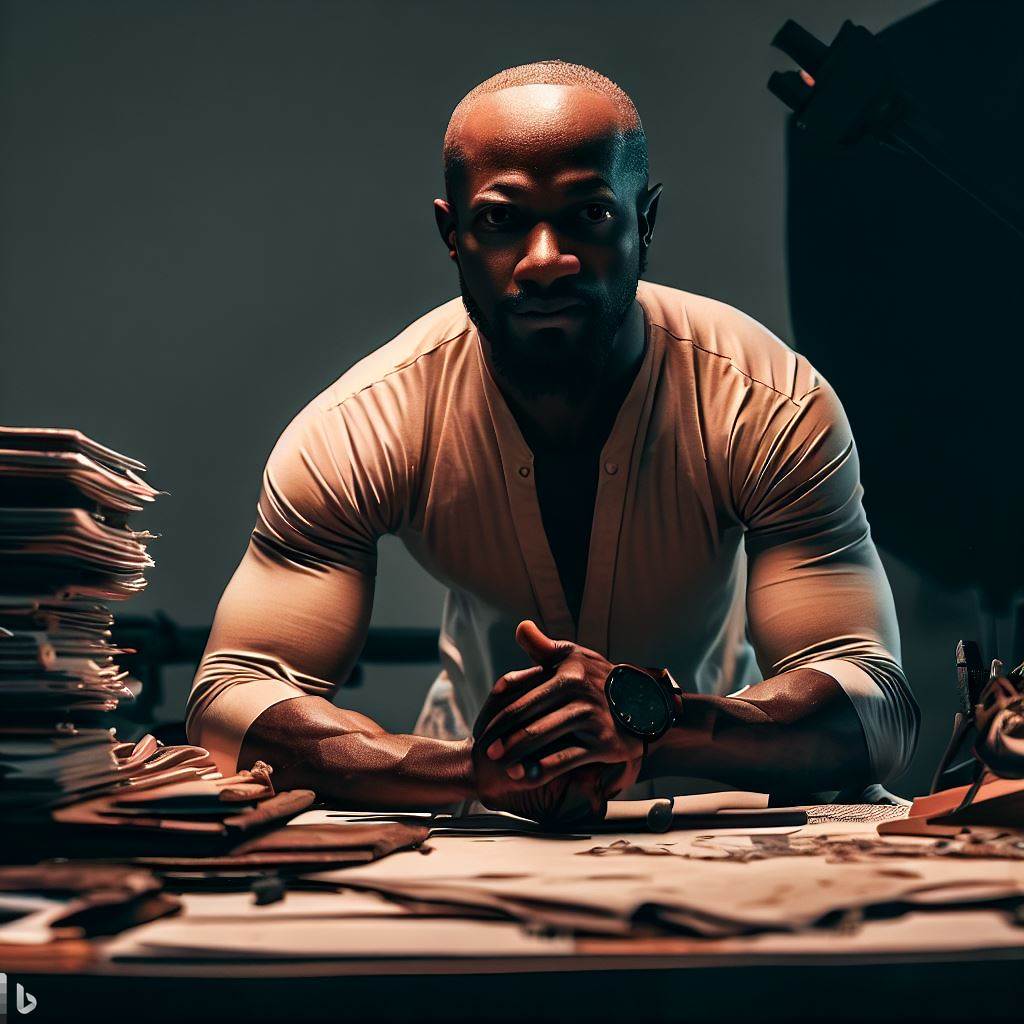Introduction
Production designers play a crucial role in the entertainment industry, contributing to the overall visual appeal and storytelling of films, TV shows, and theater productions.
Their work encompasses creating sets, costumes, props, and other design elements that bring a production to life.
In Nigeria, production designers are required to adhere to certain legal requirements to ensure their work meets industry standards and protects the interests of all stakeholders.
These requirements encompass both legal and regulatory aspects.
One key legal requirement for production designers in Nigeria is obtaining the necessary permits and licenses.
This includes securing permits for shooting in specific locations and acquiring licenses for the use of copyrighted materials, such as music or artworks.
Additionally, production designers must comply with health and safety regulations to ensure the well-being of the cast and crew during the production process.
This involves conducting risk assessments, implementing safety measures, and providing adequate training on equipment handling.
Another important aspect of the legal requirements for production designers in Nigeria is intellectual property rights.
They must respect the copyrights and trademarks of others, avoiding any unauthorized use or infringement.
This includes seeking permission to use existing designs or creating original ones that do not violate intellectual property laws.
Furthermore, production designers need to be aware of contract laws when engaging with clients, suppliers, and other collaborators.
They must ensure all agreements are properly documented, clearly specifying the scope of work, fees, and deadlines to avoid disputes or breaches.
Therefore, complying with legal requirements is crucial for production designers in Nigeria to operate within the boundaries of the law and maintain ethical practices.
By understanding and meeting these obligations, they can contribute effectively to the thriving Nigerian entertainment industry.
Education and Certification
When it comes to aspiring production designers in Nigeria, a necessary educational background is crucial.
Having proper education and certification can significantly impact one’s career in this field.
Here are some of the key aspects to consider
- Educational Background: Aspiring production designers should possess at least a bachelor’s degree in a relevant field such as graphic design, fine arts, theater arts, or film production.
This background provides a solid foundation of knowledge and skills required in production design. - Relevance of Certification: While certification is not mandatory for production designers in Nigeria, it is highly beneficial for professional growth and credibility.
Obtaining certifications demonstrates a commitment to the craft and can enhance employment opportunities.
These include:
- The National Film Institute, Jos, offers production design courses.
- University of Lagos’ Creative Arts Department aids aspiring production designers.
- Pan-Atlantic University, Lagos, provides a solid academic foundation in media arts and film production.
- Nigerian Film Corporation, Jos, offers certification courses for film professionals.
- The African Film Consortium conducts tailored programs for production designers in collaboration with various institutions.
- Continuous learning is vital for production designers to stay current with industry trends and technologies.
Attending workshops, conferences, and seminars related to production design can provide valuable insights and networking opportunities.
Collaborating with experienced production designers or mentors can also expand one’s knowledge and contribute to personal growth.
In review, aspiring production designers in Nigeria should prioritize their educational background and consider obtaining relevant certifications.
Institutions such as the National Film Institute and the University of Lagos offer programs dedicated to production design.
Additionally, organizations like the Nigerian Film Corporation and the African Film Consortium provide training and certification courses.
By continually learning and staying updated, aspiring production designers can pave the way for a successful career in Nigeria’s vibrant film industry.
Read: Fashion Design in Nigeria: Licensing & Legal Essentials
Licensing and Registration
To become a production designer in Nigeria, follow these steps:
- Submit an application to the regulatory body overseeing licensing.
- Provide proof of education, training, and work experience.
- Tailor qualifications to regulatory body’s specific requirements.
- Undergo a review by the regulatory body.
- Upon qualification, receive a production designer license.
- Register with professional bodies or associations for credibility and networking.
- Gain access to resources and educational events through these organizations.
- Maintain ongoing professional development to stay updated with industry trends and standards.
Licensing and registration enhance credibility, ensuring legal practice and attracting clients and employers.
Read: The Intersection of Art & Fashion Design in Nigeria
Health and Safety Regulations
Ensuring a safe working environment is one of the primary legal obligations that production designers in Nigeria must fulfill.
Compliance with health and safety regulations is crucial to maintain the well-being of the entire production crew and avoid any potential accidents or hazards.
Production designers have legal obligations to prioritize team safety and create risk-free work environments. Specific regulations in their field are crucial.
They must:
- Conduct thorough risk assessments to identify potential dangers.
- Implement mitigation measures, like using proper personal protective equipment (PPE).
- Carry out regular inspections for compliance and improvements.
- Develop and communicate emergency response plans.
- Ensure all crew members receive health and safety training.
- Provide safe, well-maintained equipment and tools.
- Maintain open communication and promote safety awareness.
- Keep comprehensive documentation of practices, incidents, and risk assessments.
- Collaborate with other departments, such as construction, to ensure overall safety compliance.
- Production designers must adhere to these active measures to maintain a safe working environment.
Adherence to safety rules safeguards the crew, boosts productivity, prevents accidents, and builds trust in Nigerian production designers.
Read: Insider’s Look: Production Design in Lagos, Nigeria

Intellectual Property Rights
Intellectual property rights are crucial for production designers as they protect their creative work and ideas from unauthorized use or duplication.
Understanding these rights is essential for designers in Nigeria to safeguard their intellectual property.
Overview of Intellectual Property Rights
Intellectual property rights encompass legal protections granted to individuals or entities for their artistic, creative, or innovative works.
These rights enable creators to have exclusive control over their creations, ensuring they receive recognition and financial benefits.
Production designers rely heavily on these rights to safeguard their designs from exploitation and piracy.
Copyright Laws and their Application
Copyright laws play a significant role in protecting the work of production designers.
These laws grant exclusive rights to the creators of original works, including artistic designs, sketches, blueprints, and other visual elements.
In Nigeria, copyright automatically protects the designers’ work as soon as it is created, providing them with immediate legal protection.
Specific Rights and Protections for Production Designers in Nigeria
In Nigeria, production designers enjoy specific rights and protections to safeguard their intellectual property.
These rights include:
- Reproduction Rights: Production designers have the exclusive right to reproduce their work in any form, whether printed or digital.
This ensures that their designs cannot be copied or replicated without permission. - Distribution Rights: Designers have the authority to control the distribution and dissemination of their work.
This prevents unauthorized individuals from distributing or selling their designs without proper authorization. - Public Display Rights: Production designers have the right to publicly display their work, whether in exhibitions, showcases, or movies.
This protection prohibits others from showcasing their designs without consent. - Derivative Works: Designers have the right to create derivative works based on their original designs.
This protection ensures that no one can modify or adapt their work without permission. - Moral Rights: Production designers have moral rights, which include the right to be recognized as the creator of their work and protect the integrity of their designs.
This prevents any unauthorized modifications or alterations that may damage their reputation or distort their original intent.
Intellectual property rights are of vital importance for production designers in Nigeria.
These rights provide legal protection for their creative work, ensuring they receive recognition, financial benefits, and control over their designs.
Copyright laws in Nigeria automatically grant these protections, including reproduction rights, distribution rights, public display rights, derivative works, and moral rights.
Understanding and enforcing these rights will enable production designers to thrive in a competitive and innovative industry while safeguarding their intellectual property.
Read: The Future of Production Designing in Nigeria
Environmental Regulations
Environmental considerations are crucial for production designers in Nigeria.
They must be mindful of the impact their work has on the environment and comply with relevant regulations to ensure sustainable practices.
This section explores the environmental regulations that production designers must adhere to and the responsibilities they have in waste management, energy usage, and sustainable practices.
1. Environmental Considerations
- Production designers must consider the environmental impact of their design choices.
- They should prioritize sustainable materials and practices to minimize harm to the environment.
- Efficient resource usage and waste management are key considerations for sustainable production design.
- Designers should aim to reduce the carbon footprint associated with their projects.
- Minimizing energy consumption and water usage is essential for sustainable production design.
2. Waste Management Regulations
- Production designers must comply with waste management regulations set by local authorities.
- They should minimize waste generation during the production process.
- Proper waste disposal, recycling, and reuse of materials are encouraged for sustainability.
- Designers must be aware of hazardous waste regulations and ensure safe handling and disposal.
3. Energy Usage
- Production designers should adopt energy-efficient practices to reduce their carbon footprint.
- Using energy-efficient lighting, appliances, and equipment can significantly decrease energy usage.
- Renewable energy sources, such as solar or wind, should be considered where feasible.
- Efficient use of heating, ventilation, and air conditioning systems can help conserve energy.
4. Sustainable Practices
- Designers should prioritize sustainable materials and avoid the use of harmful substances.
- They should encourage sustainable transportation options for cast, crew, and equipment.
- Promoting sustainable construction practices, such as adapting existing structures, is beneficial.
- Preserving natural landscapes and implementing effective landscaping techniques are encouraged.
- Supporting local communities and promoting social responsibility is an aspect of sustainability.
5. Impact on the Environment and Legal Responsibilities
- Production design can have a significant impact on the environment, including resource depletion and pollution.
- Designers are legally responsible for complying with environmental regulations and minimizing harm.
- Failure to adhere to environmental regulations can result in legal consequences and penalties.
- Designers should stay up to date with evolving environmental laws and adjust their practices accordingly.
- By fulfilling their legal responsibilities, designers contribute to a more sustainable and eco-friendly industry.
In summary, production designers in Nigeria have a crucial role in ensuring sustainable practices and minimizing harm to the environment.
By considering environmental factors, complying with waste management regulations, optimizing energy usage, and embracing sustainable practices, designers can contribute to a more eco-friendly and responsible industry.
Employment Standards and Contracts
The legal requirements for employment contracts of production designers in Nigeria are as follows
- Written Contract: An employment contract must be in writing and signed by both parties.
- Duration of Contract: The contract should specify the duration of employment, whether it is for a fixed term or an indefinite period.
- Working Hours: The contract should define the working hours, including any overtime conditions and compensation.
- Remuneration: The contract must clearly state the agreed-upon salary or wage, including any benefits or allowances.
- Termination: The terms and conditions for termination of employment should be clearly outlined in the contract.
- Severance Pay: The contract must include provisions for severance pay in case of termination without cause.
- Confidentiality: Production designers may have access to sensitive information, so confidentiality clauses should be included in the contract.
- Intellectual Property: Any intellectual property created by the production designer during their employment should be addressed in the contract.
A typical contract for a production designer should include the following elements
- Job Title and Description: Clearly define the role and responsibilities of the production designer.
- Working Hours: Specify the expected working hours and any flexibility or overtime conditions.
- Compensation: Detail the agreed-upon salary or wage, including benefits, allowances, and payment frequency.
- Duration of Employment: Specify whether the contract is for a fixed term or an indefinite period.
- Termination Clause: Outline the conditions under which either party can terminate the contract.
- Severance Pay: Include provisions for severance pay in case of termination without cause.
- Confidentiality and Nondisclosure: Clearly state the obligation to maintain confidentiality of sensitive information.
- Intellectual Property Rights: Address the ownership and use of any intellectual property created during employment.
Clearly defined roles, responsibilities, and compensation terms are essential for production designers in Nigeria for the following reasons
- Clarity: Clearly defined roles and responsibilities ensure that both the production designer and employer understand their expectations.
- Efficiency: When roles and responsibilities are well-defined, team members can work more efficiently, avoiding confusion and duplication of efforts.
- Accountability: Clearly defined roles create accountability, as individuals know exactly what is expected of them.
- Conflict Resolution: If disputes arise, having clearly defined roles and responsibilities can help resolve conflicts more easily.
- Fair Compensation: Clearly outlined compensation terms ensure that production designers are paid accurately and fairly.
- Legal Compliance: Clearly defined roles and responsibilities ensure compliance with employment laws and regulations in Nigeria.
Lastly, employment contracts for production designers in Nigeria must meet legal requirements and include essential elements such as job descriptions, working hours, compensation terms, and termination clauses.
Clearly defining roles, responsibilities, and compensation terms is crucial for productivity, accountability, and legal compliance.
See Related Content: Nigerian Illustrators: Success Stories and Inspiration
Conclusion
To summarize, production designers in Nigeria must adhere to several legal requirements to ensure a successful career.
First, they must obtain the necessary permits and licenses for their projects.
Second, they must comply with copyright laws and ensure they have the appropriate rights for the materials used.
Third, they must provide safe working conditions for their crew and actors. Additionally, they should consider insurance options to protect themselves and their work.
Failure to comply with these requirements can lead to legal issues and damage to one’s reputation.
Complying with these legal requirements is crucial for production designers in Nigeria.
By doing so, they can build a strong and legally sound career. It ensures that their work is protected, their projects run smoothly, and they avoid potential legal disputes and penalties.
It also allows them to establish trust and credibility within the industry.
If you are interested in pursuing a career as a production designer in Nigeria, there are several resources and references available.
The Nigerian Film Corporation can provide guidance on the legal aspects of production design.
Additionally, consulting with experienced professionals in the industry can offer valuable insights and advice.
Staying updated with relevant regulations and industry practices is key to a successful career as a production designer in Nigeria.




